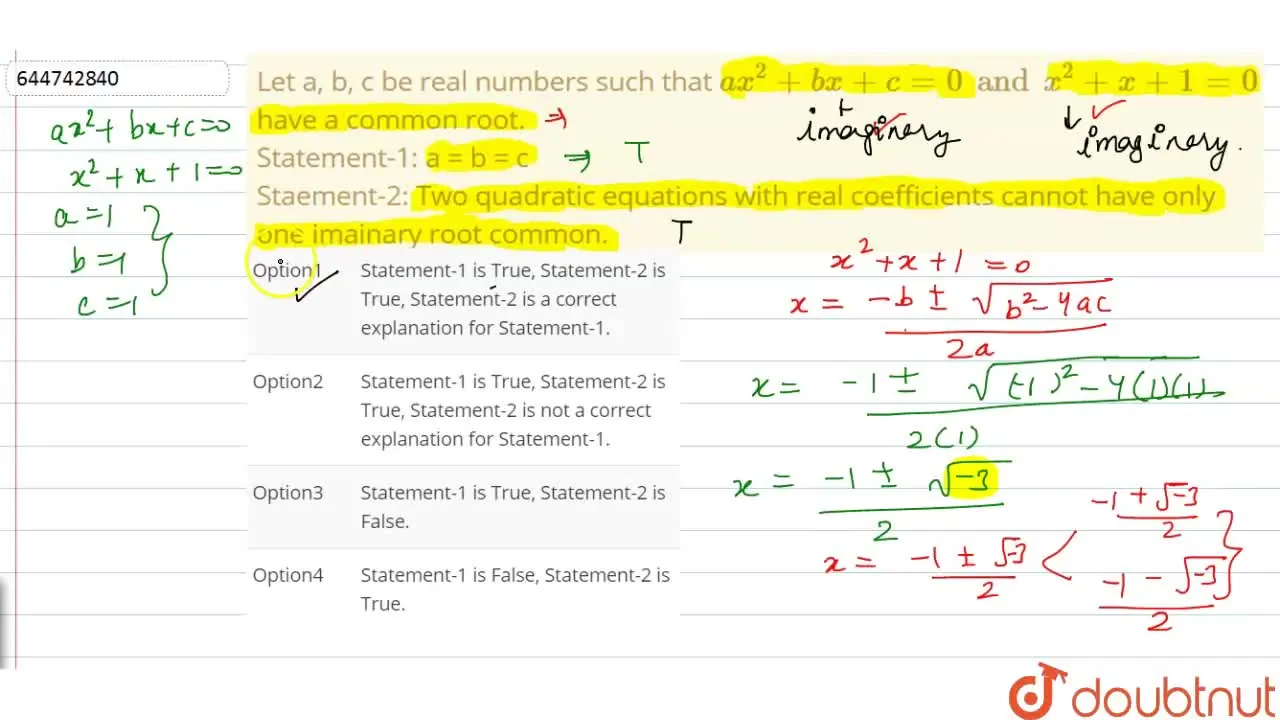Let a, b, c be real numbers such that have a common root.
Statement-1: a = b = c
Staement-2: Two quadratic equations with real coefficients cannot have only one imainary root common.
Statement-1 is True, Statement-2 is True, Statement-2 is a correct explanation for Statement-1.
Statement-1 is True, Statement-2 is True, Statement-2 is not a correct explanation for Statement-1.
Statement-1 is True, Statement-2 is False.
Statement-1 is False, Statement-2 is True.
The correct Answer is:A
The equation has imaginary roots has one imaginary root common, then other imaginary root must also be common as imaginary roots occur in pairs. So, statement-2 is true.
Given equations have both roots common.
So, statement-1 is also true and statement-2 is a correct explanation for statement-1.
Related Playlists
- BOOK - OBJECTIVE RD SHARMA ENGLISHCHAPTER - QUADRATIC EXPRESSIONS AND EQUATIONS EXERCISE - Exercise138videos
QUADRATIC EXPRESSIONS AND EQUATIONS
- BOOK - OBJECTIVE RD SHARMA ENGLISHCHAPTER - QUADRATIC EXPRESSIONS AND EQUATIONS EXERCISE - Chapter Test50videos
QUADRATIC EXPRESSIONS AND EQUATIONS
- BOOK - OBJECTIVE RD SHARMA ENGLISHCHAPTER - QUADRATIC EXPRESSIONS AND EQUATIONS EXERCISE - Section I - Solved Mcqs123videos
QUADRATIC EXPRESSIONS AND EQUATIONS
- BOOK - OBJECTIVE RD SHARMA ENGLISHCHAPTER - PROBABILITY EXERCISE - Chapter Test45videos
PROBABILITY
- BOOK - OBJECTIVE RD SHARMA ENGLISHCHAPTER - SEQUENCES AND SERIESEXERCISE - Chapter Test59videos
SEQUENCES AND SERIES
Similar Questions
If the equation ax2+bx+c=0and2x2+3x+4=0 have a common root, then a : b : c
View SolutionIf a, b, c are positive real numbers such that the equations ax2+bx+c=0andbx2+cx+a=0, have a common root, then
View SolutionIf x2+ax+b=0,x2+bx+a=0 (a≠0) have a common root, then a + b =
View SolutionIf a,b,c,∈R and equations ax2+bx+c=0 and x2+2x+9=0 have a common root then
View SolutionIf the equations ax2+bx+c=0andx2+x+1=0 has one common root then a:b:c is equal to
View SolutionIf the equations ax2+bx+c=0 and x3+x−2=0 have two common roots then show that 2a=2b=c.
View SolutionIf the equations 2x2−7x+1=0 and ax2+bx+2=0 have a common root, then
View SolutionIf a,b,c∈R and the equation ax2+bx+c=0andx2+x+1=0 have a common root, then
View SolutionIf a,b,c∈R and equations ax2+bx+c=0 and x2+2x+9=0 have a common root, show that a:b:c=1 : 2 : 9.
View SolutionIf ax2+bx+c=0andbx2+cx+a=0 have a common root, prove that a+b+c=0ora=b=c.
View Solution


